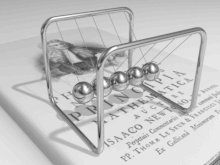Physics (from the Ancient Greek φύσις physis meaning "nature") is the fundamental branch of science. The primary objects of study are matter and energy. Physics is, in one sense, the oldest and most basic academic pursuit; its discoveries find applications throughout the natural sciences, since matter and energy are the basic constituents of the natural world. The other sciences are generally more limited in their scope and may be considered branches that have split off from physics to become sciences in their own right. Physics today may be divided loosely into classical physics and modern physics.
Elements of what became physics were drawn primarily from the fields of astronomy, optics, and mechanics, which were methodologically united through the study of geometry. These mathematical disciplines began in antiquity with the Babylonians and with Hellenistic writers such as Archimedes and Ptolemy. Ancient philosophy, meanwhile – including what was called "physics" – focused on explaining nature through ideas such as Aristotle's four types of "cause".
Ancient Greece[edit]
The move towards a rational understanding of nature began at least since the Archaic period in Greece (650–480 BCE) with the Pre-Socratic philosophers. The philosopher Thales of Miletus (7th and 6th centuries BCE), dubbed "the Father of Science" for refusing to accept various supernatural, religious or mythological explanations for natural phenomena, proclaimed that every event had a natural cause.[2] Thales also made advancements in 580 BCE by suggesting that water is the basic element, experimenting with the attraction between magnets and rubbed amber and formulating the first recorded cosmologies. Anaximander, famous for his proto-evolutionary theory, disputed the Thales' ideas and proposed that rather than water, a substance called apeiron was the building block of all matter. Around 500 BCE, Heraclitus proposed that the only basic law governing the Universe was the principle of change and that nothing remains in the same state indefinitely. This observation made him one of the first scholars in ancient physics to address the role of time in the universe, a key and sometimes contentious concept in modern and present-day physics.[citation needed] The early physicist Leucippus (fl. first half of the 5th century BCE) adamantly opposed the idea of direct divine intervention in the universe, proposing instead that natural phenomena had a natural cause. Leucippus and his student Democritus were the first to develop the theory of atomism, the idea that everything is composed entirely of various imperishable, indivisible elements called atoms.
During the classical period in Greece (6th, 5th and 4th centuries BCE) and in Hellenistic times, natural philosophy slowly developed into an exciting and contentious field of study. Aristotle (Greek: Ἀριστοτέλης, Aristotélēs) (384 – 322 BCE), a student of Plato, promoted the concept that observation of physical phenomena could ultimately lead to the discovery of the natural laws governing them.[citation needed] Aristotle's writings cover physics, metaphysics, poetry, theater, music, logic, rhetoric, linguistics, politics, government, ethics, biology and zoology. He wrote the first work which refers to that line of study as "Physics" – in the 4th century BCE, Aristotle founded the system known as Aristotelian physics. He attempted to explain ideas such as motion (and gravity) with the theory of four elements. Aristotle believed that all matter was made up of aether, or some combination of four elements: earth, water, air, and fire. According to Aristotle, these four terrestrial elements are capable of inter-transformation and move toward their natural place, so a stone falls downward toward the center of the cosmos, but flames rise upward toward the circumference. Eventually, Aristotelian physics became enormously popular for many centuries in Europe, informing the scientific and scholastic developments of the Middle Ages. It remained the mainstream scientific paradigm in Europe until the time of Galileo Galilei and Isaac Newton.
Early in Classical Greece, knowledge that the Earth is spherical ("round") was common. Around 240 BCE, as the result a seminal experiment, Eratosthenes (276–194 BCE) accurately estimated its circumference. In contrast to Aristotle's geocentric views, Aristarchus of Samos (Greek: Ἀρίσταρχος; c.310 – c.230 BCE) presented an explicit argument for a heliocentric model of the Solar system, i.e. for placing the Sun, not the Earth, at its centre. Seleucus of Seleucia, a follower of Aristarchus' heliocentric theory, stated that the Earth rotated around its own axis, which, in turn, revolved around the Sun. Though the arguments he used were lost, Plutarch stated that Seleucus was the first to prove the heliocentric system through reasoning.
(source: https://en.wikipedia.org/wiki/History_of_physics)

Komentar
Posting Komentar